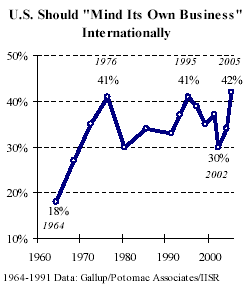To be perfectly honest, the real point of this particular post is to make a few comments regarding web-based sources in general and Wikipedia in particular that might be helpful to my students. But because Swords into Plowshares is about international politics, a few preliminary comments may help to keep readers who aren't a part of the student population from tuning out.
Wikipedia, the web-based encyclopedia that is written, edited, and updated by any Internet user who cares to contribute, is an amazing phenomenon. Launched in 2001, the project generated over 20,000 encyclopedia articles in its first year and over 250,000 in English alone by April 2004. Another 600,000 articles in 50 additional languages were also online by that date. Today there are over 800,000 articles in English alone.
As I write this, Wikipedia.org is the 35th most commonly visited web site in the world, according to Alexa.com. It gets more hits each day than the New York Times and the Washington Post web sites put together.
Tom Friedman, in his bestseller The World Is Flat, uses Wikipedia as an example of open-sourcing, one of the "ten forces that flattened the world." On page 95, Friedman quotes Andrew Lih, author of an essay in YaleGlobal, who notes that Wikipedia
provides a manifold view of issues from the World Trade Organization and multinational corporations to the anti-globalization movement and threats to cultural diversity. At the same time malicious contributors are kept in check because vandalism is easily undone. Users dedicated to fixing vandalism watch the list of recent changes, fixing problems within minutes, if not seconds. A defaced article can quickly be returned to an acceptable version with just one click of a button. This crucial asymmetry tips the balance in favor of productive and cooperative members of the wiki community, allowing quality content to prevail.
But is there really quality content in Wikipedia? How trustworthy is the information it dispenses? Anyone wanting a general introduction to any of the hundreds of thousands of topics listed would probably be quite satisfied. But those whose lives (or grades) depended on their research might prefer to consult a more reputable source.
Recently, the Guardian (London) asked a number of experts to check the Wikipedia articles on the subjects they know best. Entries on composer Steve Reich, the Basque people, British diarist Samuel Pepys, and encyclopedias were among those evaluated. Most of the experts found problems with the articles devoted to their specialties. Some were trivial errors, some were more consequential mistakes, and a few of the problems were stylistic rather than factual. (Two evaluators thought the writing was poor.)
Essentially, the problem with Wikipedia from an academic standpoint is the same as the problem with the Internet in general. Its openness (open-sourcing) means that some of its content will be outstanding, some will be mediocre, and some will be very poor. Unfortunately, discerning the difference between the good, the bad, and the ugly may require a level of expertise beyond what is available to a reader who, we shouldn't forget, probably came to the Internet looking to be educated.
In theory, the peer-review process and the editing that occurs in the world of academic publishing serve to ensure that what is published is, if not outstanding, at least reliable. Of course, all scholars can point to peer-reviewed articles or books that they think represent a waste of paper. (I'm reminded of Dorothy Parker's famous comment about a work of fiction: "This is not a novel to be tossed aside lightly. It should be thrown with great force.") But, generally speaking, scholarship is scholarship not because it is produced by scholars but because it is scrutinized (and deemed acceptable) by scholars.
My opposition to the use of Wikipedia as a scholarly source was put to the test at a recent conference. Among the half dozen or so papers that I picked up, two cited Wikipedia articles. Both papers were written by well established scholars. I had to ask myself if my own standards for quality research might be too high. But, after seeing this, I've decided they're not. With Wikipedia, it's caveat lector.

